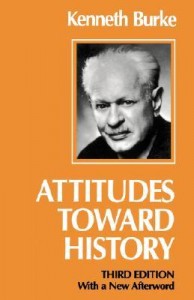 Since I’m running anchor in this relay, I hope my post will bring Burke to a kind of finish line for the week.
Since I’m running anchor in this relay, I hope my post will bring Burke to a kind of finish line for the week.
Before diving in here, however, be sure to read the prior posts by Ben Alpers, Andrew Hartman, Bill Fine*, and Andy Seal. Alpers’ post is a first-rate introduction to the book. Hartman deepens that introduction by linking Burke to two texts, by Denning and Genter, that historicize Burke as a revolutionary socialist thinker and late modernist, respectively. Hartman also elaborates on two key Burkean concepts, “frames of acceptance” and the stealing back and forth of symbols. Fine digs—very thoroughly—into Burke’s thinking on ‘identity’, ‘corporate identity’, and ‘identification’ as distinct concepts. Seal offers a intriguing reading of Burke in the context of ‘self-help’, thinking about Attitudes Toward History (ATH) in relation to works by William James and (gulp!) Dale Carnegie. To Seal, Burke sees history as a collective legacy of mistakes, symbols, and the anodyne that functions as a kind of mine producing little gems that might, if we use it well, help people get along.
The act of reading Burke with other intellectual historians enabled me to both historicize Burke and ponder how he might help with my ongoing effort to retool and refine my own historical theory. In terms of historical context, Hartman reminded us of Denning’s account of Burke in relation to the Popular Front. I read Denning with so many other goals in mind that I had forgotten about Burke’s importance in The Cultural Front. I was recently reminded, however of Burke’s prominence with early twentieth-century socialist thought when I recently read Dorothy Day’s The Long Loneliness. Day ran with Burke and other folks when she was a young New York City journalist. Having just read about Burke through Day, Hartman’s proposal to read ATH with colleagues created a moment of intellectual serendipity for me.
In terms of theory, what impressed me most about Burke was his effort to read history through an unorthodox Marxist humanist lens. Burke’s focus on symbols, pre-Kuhnian paradigms (i.e. frames of acceptance and their shifts), and the comic/tragic frame (i.e. perspective by incongruity) gave me an entirely new set of terms for dealing with the so-called superstructure. Coupled with my recent rethinking of Gramsci (on the passing of Stuart Hall) and my deep reading in Critical Theory, I feel as if Burke maybe rounding out my period of retooling. Between Burke, Hall, Gramsci, Horkheimer, and Habermas, I may be approaching new eclectic synthesis with my prior non-Marxist, Susman-Higham-Lowenthal-and-Lovejovian approach to cultural and intellectual history, as well as historical thinking.**
The cash value of Burke is less about any systematic Marxist way of thinking humanistically than Burke providing a unique vocabulary for pondering past and present events. Sure, Burke addresses older Marxist ideas and terminology: alienation, materialism, and historicism. But I found his ideas about ‘perspective by incongruity’, ‘bureaucratization of the imaginative’, ‘counter-nature’, and—as Andrew noted—‘stealing back and forth of symbols’ to be thoughtful new frameworks for dealing with historical thinking concepts such as causation, change over time, competing narratives, complexity, context, and storytelling. I even found myself rethinking Susman’s personality framework. Lastly, in the long final 1983 ‘Afterword: In Retrospective Prospect’, I was impressed with Burke’s notion for thinking about technology and the instrumentalization of structures (related to ‘counter-nature’ and connected to Burke’s ‘bureaucratization of the imaginative’). I think about this instrumentalization quite often in the context of current subsistence work, where what I call ‘edumetrics’ is taking over.
Returning to historical theory, I found myself wondering, in relation to my past an present historical work, ‘What would Burke do?’ How would Burke write this or that history? How would he think it through, and write a narrative? I don’t have any distinct or precise vision of how Burke would actually do the work I have in mind. But I know that his terminology will be at least in mind, and likely appearing in my future work. – TL
—————————————-
*I offer a special thanks to Bill Fine for filling in on my regular Thursday spot.
** There is no mention of Gramsci, Horkheimer, Adorno, or Habermas in ATH.

4 Thoughts on this Post
S-USIH Comment Policy
We ask that those who participate in the discussions generated in the Comments section do so with the same decorum as they would in any other academic setting or context. Since the USIH bloggers write under our real names, we would prefer that our commenters also identify themselves by their real name. As our primary goal is to stimulate and engage in fruitful and productive discussion, ad hominem attacks (personal or professional), unnecessary insults, and/or mean-spiritedness have no place in the USIH Blog’s Comments section. Therefore, we reserve the right to remove any comments that contain any of the above and/or are not intended to further the discussion of the topic of the post. We welcome suggestions for corrections to any of our posts. As the official blog of the Society of US Intellectual History, we hope to foster a diverse community of scholars and readers who engage with one another in discussions of US intellectual history, broadly understood.
“There is no mention of Gramsci, Horkheimer, Adorno, or Habermas in ATH.”
Given that Habermas hand’t yet turned ten, Burke would have had to be a prophet to mention him in the 1937 book.
See below.
In the 3rd edition, which we were reading, there is a long Afterward written in 1983 where, if the author had chosen, he could have included some of the above notable omissions. He did in fact make mention of C. Wright Mills who would have been 20+ in 1937…and not yet attending college.
Thanks Paul. You made my point for me. – TL